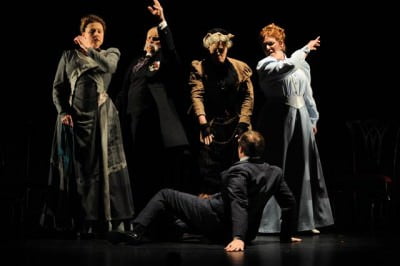Owen Wingrave

An Opera in two acts
Benjamin Britten
libretto by Myfawny Piper
(Not) To Fight: Class and Strife in English Military Families
For as long as there is a military, there will be wars to be fought; as long as there is a military, there will be families whose legacy it is to populate the armies. Thus is the essential drama in Benjamin Britten’s 1971 opera, Owen Wingrave, now playing at Chicago Opera Theater. Written in part in reaction to the Vietnam War, Britten’s pacifism is actually more deeply rooted: during the Second World War he left England for America as a conscientious objector. The opera, then, is ostensibly an antiwar statement, as Britten, perhaps, identifies with young Owen as he shirks his inherited military destiny.

Owen Wingrave is the third and final opera of Chicago Opera Theater’s 2009 season. Over the years COT has proven its commitment to performing both classics and overlooked gems like this one and, in so doing, takes more chances with programming and direction than other opera companies. Presenting Britten’s relatively unknown opera on the heels of its Carmen production is a reminder that opera is more than the stereotypical reputation it has in popular culture—a reputation that often precedes and mars the experience of new audience members.
COT’s production blends seamlessly with the content of the opera. Whereas their more adventurous productions can create a rift between music-drama and staging (see: Don Giovanni), this production is appropriately dark and introspective and set in the timelessness of English culture. The singers and orchestra, in general, neither make or break the opera: aside from some tuning issues in the orchestra, the musicians are mostly vehicles for the music, leaving their egos at the door. Owen, played by Matthew Worth, stood out from the crowd: his voice was an impossible combination of effortlessness and weightlessness with just the right amount of depth. I also enjoyed the voices of Matt Boehler and Rebecca Caine playing Mr. and Mrs. Coyle, who, admittedly, had an easier time pleasing the audience simply by playing more amiable characters. It was bemusing to see Mr. Boehler and try to remember him playing the lecherous Leporello in Don Giovanni.
Like any opera, so they say, the success relies more on the plot than almost anything else. I found this plot interesting from an anthropological perspective but somewhat one-dimensional as a piece of literature. Once Owen reveals his desire to leave the army, the talk is of almost nothing else. Most of the characters are almost caricatures, whereas Owen’s is perhaps the most three-dimensional: he understands the forces against him and then expressing the most free will in opposition thereto. And yet, his character is as stubborn and one-track as any of the others. The one major diversion is the supernatural element, which seems insignificant throughout most of the opera but then, in the end, turns out to tell the same story. All that being said, it was hardly ever boring; there were just a few dull scenes involving ghosts that did not succeed in capturing my wanderlust attention. Overall, I found it interesting because it is a world that I had not ever be able to imagine, indeed, not even really believing in its existence. It is a world that surely exists in the U.S. as well, but Britten’s world is even more extreme due to the rigidity of the English class system.
While the plot seems relatively uninspired, the music keeps your attention with a diversity of styles and textures. Britten’s interest in atonality comes through during more conversational moments when the vocal lines can seem almost awkward and unmusical, but these passages are balanced by a couple beautiful more diatonic arias. One hears many influences mixed together but subdued: his atonality never reaches the unsettled angst of a composer like Schoenberg, and his arias are never quite as lyrical as Puccini.
Britten’s Owen Wingrave may never be a classic, but it is a well-crafted work of theater mixed with creative orchestration and angular vocal writing. I enjoyed it through to the end, and, in fact, enjoyed it even more because of the way in which it ended: it was almost as if the whole opera was building you up for the final twist of fate. It gave me a sense of unsettled mystery that almost gave way to a beautiful mixture of sadness and beauty.
Somewhat Recommended
Evan Kuchar
At the Harris Theater for Music and Dance in Millennium Park – 205 E. Randolph, Chicago, IL. Call 312.704.8414 or visit ChicagoOperaTheater.org for tickets ($30-$120); student tickets available at 50% discount. Performances: May 16, 20, 22, 24, and 26, 2009
